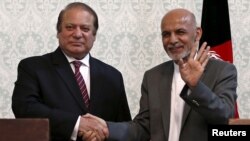Pakistan’s prime minister made what may be some of his strongest remarks ever in support of peace in Afghanistan during his day trip to Kabul Tuesday. His statement also seemed to be carrying a message for the Afghan Taliban: The days of Pakistan looking the other way while they carry out violence in Afghanistan are over.
Army Chief General Raheel Sharif accompanied Nawaz Sharif on the prime minister’s first trip to Afghanistan after last year’s elections and the formation of the Unity Government. Abdul Ghafoor Lewal, head of the Afghanistan Regional Studies Center, a government think tank based in Kabul, thinks this was to reassure President Ashraf Ghani that Pakistan’s civilian and military leadership are in agreement. The trip was aimed at easing Kabul’s concerns that Pakistan is not doing enough to facilitate talks with the Taliban.
In a prepared statement, Prime Minister Sharif condemned the Afghan Taliban’s spring offensive and warned them that the continuation "of such offensive and attacks will be construed as terrorist acts and we condemn such attacks in strongest terms.”
He also responded to what has been a longstanding Afghan complaint that while Islamabad fights the Pakistani Taliban, it still looks the other way where Afghan Taliban are concerned.
“All sanctuaries, when found, will be eliminated by direct action,” Sharif promised. “Any effort by any militant or group to destabilize Afghanistan will be dealt with severely, and such elements will be outlawed and hunted down.”
Sharif also vowed to take coordinated action with Afghanistan against militant hideouts along the border.
While the army chief did not speak, the army’s spokesman, Major General Asim Bajwa, tweeted the same message. He said the relationship will be based on non-interference in each other’s affairs, and that the two countries will not allow their territories to be used against one another.
Relations between Pakistan and Afghanistan have been warming since Ashraf Ghani was elected president. Former President Hamid Karzai often accused Pakistan of harboring terrorists and providing them with sanctuaries. President Ghani has changed the discourse to emphasize joint threats and mutual economic benefits through stability in Afghanistan.
However, he has come under criticism, particularly from supporters of his predecessor, for becoming too close to Pakistan at the expense of Afghanistan’s relationship with regional power India.
Supporters think Ghani has taken a calculated risk in the hopes of changing Islamabad's behavior.
Pakistan had long supported the Afghan Taliban in its efforts to keep Indian influence along its western border to a minimum. Pakistan was one of one only three countries in the world that recognized the Taliban government in Kabul as legitimate before the American-led invasion ousted it following the al-Qaida attacks on the United States in 2001.
After that, Pakistan joined the U.S.-led war against terror in the region, but American officials and analysts in Washington often accused the country’s military and intelligence agencies of playing a double game and secretly supporting elements of Afghan Taliban.
However, the election of Ashraf Ghani in Afghanistan, and in Pakistan, General Sharif's rise to command the military, resulted in a change of rhetoric on all sides.
Army Chief Raheel Sharif has said that Afghanistan’s enemies are Pakistan’s enemies, a remark the Pakistani prime minister repeated Tuesday.
President Ghani, in his statement, mentioned the importance of clarity of vision and of taking a long-term perspective for the prosperity of all regional countries, rather than repeating “short-sighted” mistakes of the past.
Pakistan’s military is carrying out an operation in the restive tribal areas of North Waziristan that border Afghanistan. The operation is primarily aimed at the Pakistani Taliban but the army insists it does not differentiate among various militant groups.
Rustam Shah Mohmand, Pakistan’s former ambassador to Afghanistan, told VOA that there is a limit to Pakistan’s influence with the Taliban. They can bring them to the negotiating table but cannot control the outcome.
“Because the Afghan Taliban would take their own decisions and already there are signs that many Afghan Taliban are very angry with Pakistan for pressuring them to sit for talks in Doha,” Mohmand said.
However, several Afghans who participated in a recent round of what was termed “open discussions” in Qatar’s capital Doha, seemed to be more optimistic on the softening of the Taliban stance on some key issues, like women’s rights.
Malalai Shinwari, the only woman present during those talks, said that the Taliban attitude was different from the past.
“They listened to me,” she said.




